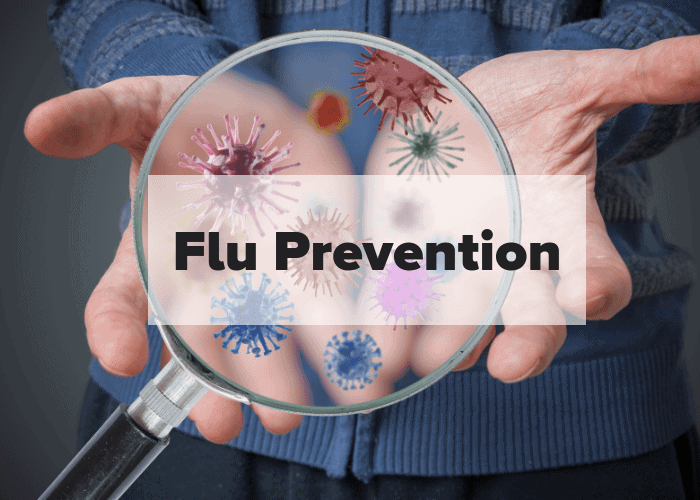Hi, this is Dr. Emily Parke with your functional health minute for today. Today, I’d like to talk to you a little bit about cold and flu prevention. So of course there’s easy things you can do to prevent getting an infection like very good hand washing. And this is one of the most common things that gets missed in the decreasing of transmission of cold and flu viruses. So make sure you’re doing very good hand washing, especially after you’ve been out in public places. And of course you want to make sure you either wash your hands or have some type of good hand sanitizer with you. I do recommend using the more natural hand sanitizers. There are lots of good brands out there. For example, there’s a brand called Clean Well, and there’s a brand called EO. They both have really good natural hand sanitizers.
And of course, when you are out and about in public places, you also want to not really touch your face too much. Imagine you’re pushing a grocery cart that’s been pushed by someone that had a cold or flu, and then you go like this and rub your nose. Well, you may have just inoculated yourself with that virus, so take care not to excessively touch your face, especially, when you’re out in public during flu season. But definitely the hand washing and/or hand sanitization when you can’t wash your hands is really important.
Of course, other basic things you can do are making sure you’re getting enough good quality sleep and enough rest and reducing stress. We know that high stress states, of course, decrease your immunity, your immune system. So your immune system will be less likely to fight off infections if stress levels are high. Stress is stress of all kinds, right? Like I mentioned, not getting enough good quality sleep, mental/emotional stress, physical stress. It can even be over-exercising, not getting enough recovery time.
So those are all important factors in prevention of cold and flu. Then, of course, getting really into the specifics, wanting to make sure that there are certain nutrients that are not deficient. For example, vitamin D. Vitamin D is crucial for the immune system. Vitamin A also important for the immune system. Zinc is also very important for the immune system, and there are lots of other nutrients that play a role in the immune system, but you want to make sure that you’re getting at least those levels checked to make sure that they are in an optimal range, not even a normal range, but an optimal range to help support your immune system.
And then, of course, remembering that about 80% of your immune system is located inside your gut, so what you put in, in other words, the foods that you eat also play a big role in your immune system. And of course, what is going on inside the gut, like are there chronic infections or overgrowths of potential pathogens, or are there not enough good, healthy gut bacteria going on there, too. So those are the things that you can work on, especially during cold and flu season. So like now is definitely, I know it’s holiday time, and everyone wants to eat the cookies and the sugar and all the treats that are made for holidays, but as far as your immune system goes and your health, that’s exactly the opposite of what you want to be doing.
Now, it’s not to say you can’t have a bite here and there, right? I always tell my patients 80/20 as far as being compliant with your plan, or 90/10, depending on how sick you are. So it’s not to deprive yourself 100%, but just be aware that those, eating processes, packaged food items can affect your gut, and thus your immune system as well. This is Dr. Emily Parke with your functional health minute for today.









